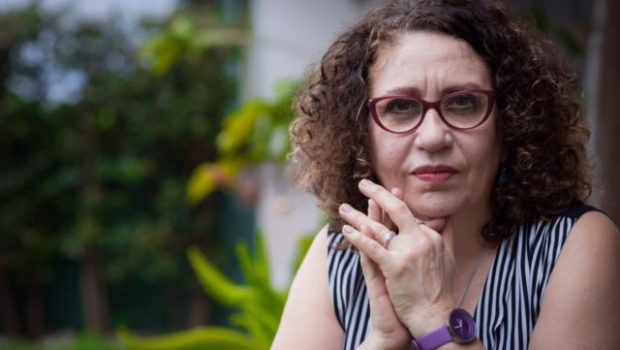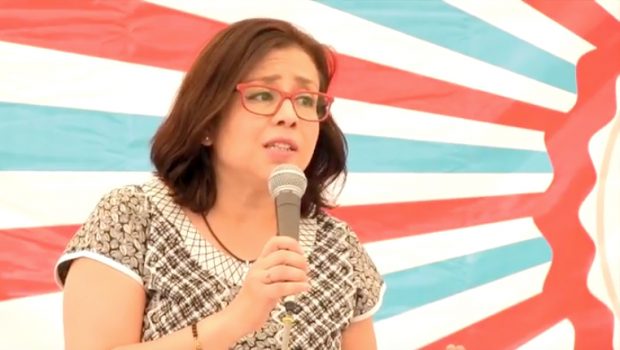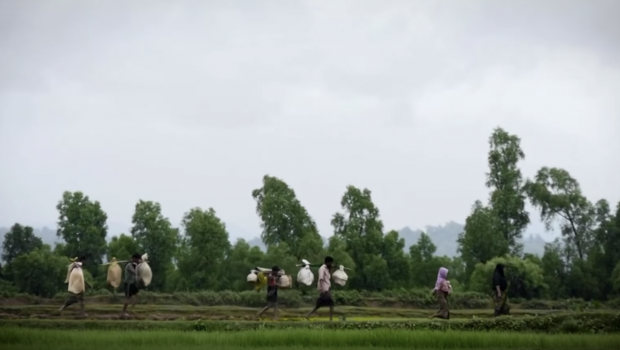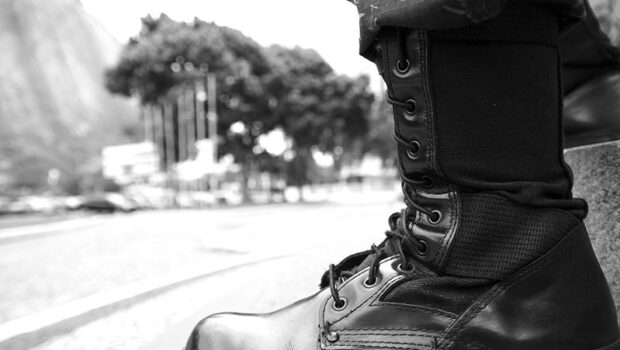Three unpublished poems
Tres poemas inéditos
Edda Armas
Translated by Tanya Huntington
AMATITÁN
You were forewarned by the gale,
a dry aroma drying on your face
just after you’d set foot
in the home of horseshoes:
…so much heart
…could steal yours
…with one blow.
And you heard signals in the vicinity
that bore the elongated form of ribbons,
some tied to others,
through the frugal buttonhole of these winds.
Withdrawn and seated in its shadow now,
you shelled the corncobs with purpled
and gold-stacked teeth and turned them
into bread. An order handed down, perhaps.
You create each day; rituals are repeated.
Meticulous breathing mechanisms
measured in the women’s bodies:
while folding patchwork quilts
where nine patiently embroidered
vivid agave flowers
are stalked by tiger claws.
Another time you watch
sidelong and with fresh eyes,
tequila does refresh the throat
parsimoniously as the ember burns
and the ribbons unleash fragments
of bound voices still resisting just
as piously as one who understands
the dead lyrics in a song.
And as the cool breeze reaches us, tell me, Frida,
before the perennial night
spreads farther still over us women:
what bread shall we make, broken hearted,
wearing the face of this bare day?
For Frida K. at her blue house, tequila in hand.
CESTRUM NOCTURNUM
It is the tree who sees
René Char
How can you, tree, fulfill me without my having even learned your name or that of your species, and things being what they are, pointlessly knowing your fragrance, so similar to that of orange blossom or jasmine with your tiny trumpet flowers, with your sweet elixir that draws wasps and hummingbirds alike.
A noble presence, yours, in a corner of the backyard, accompanying the precarious hour when you doubt and wonder: how can life give us hope of rebirth among thornless greenery, in a nest the little bird assembles between these weakened branches?
You get attached. You watch over the slow growth of its stems, the furious budding of new leaves, the ones you will see fall all the same, withered by the inclement sun
or abused by the worm that leaps from the neighboring tree, or the leafcutter ants that ascend entwining branches to reach
its most tender nucleus.
Since I will not let them trim your branches, you have unfurled your vigor with clustered arms of light, white weight, and the house is nourished by your ever-nocturnal perfumery.
All trees planted in alien soil mourn the open side, never suspecting that the root is the same one that sustains you in the intemperate watchfulness of your senses,
subjecting you to the harsh reality in which you live.
ON PARTING, A KISS
Dispiriting, the lack of detachment of the last leaf to
fall from the tree.
You never know what circles you’ll go in. Perhaps we
will meet again, you say to yourself, while at the same
time a child in someone’s arms smiles at you in line
at the supermarket and with a frail gesture, waves goodbye.
You go back to the inevitable circles. The line grows long. You watch
yourself in that mirror. You hoard what you’ll let go. The summer
dies when you leave, in Sabina’s words… and you get ready
for a change of scenery, deaf as you are.
You fix your stare in the mirror, sharpen the vertical
frame, open the inner ear, gain focus.
And so you see the birds return to what’s appealing, in the already
distant dwelling of nostalgia. You must leave, it is the “x”
that marks the spot in the lives of others as well, and you start
to chant the mantra for a day of incomparable light.
You will never know the last time for anything,
nor the parting kiss, much less
……the resonance of your own shadow
on the same street as your adventures,
……the one you take your leave from this instant
all alone, brooding, and no books at your bedside.
For Joaquín, without a doubt.
*Cover image by Guillermo Suárez
 Edda Armas (Caracas, 1955). Poet. Editor. Social psychologist specializing in cultural production. Author of 15 books of poetry published between 1975 and 2016, including: Roto todo silencio with illustrations by Rumanian artist Daniel Medvedov (2016), Sin negativo y estaciones (2012), Corona mar (2011), Toma lo simple por el tallo (2009), Casa y arcángel (NY, 2008), Armadura de piedra (2005), Sable (1994, Municipal Poetry Prize of 1995, Caracas Mayor’s Office), En bicicleta (2003, International Poetry Prize, J.A. Ramos Sucre XIV Literary Biennale) and the personal anthology Dagas y otras flores in Monte Ávila Editores (2007). Armas has represented her country at poetry encounters in Spain, Mexico, the United States, El Salvador, The Dominican Republic, Peru, Ecuador, and Colombia. She has also acted as head of the PEN Club of Venezuela (2005-2009).
Edda Armas (Caracas, 1955). Poet. Editor. Social psychologist specializing in cultural production. Author of 15 books of poetry published between 1975 and 2016, including: Roto todo silencio with illustrations by Rumanian artist Daniel Medvedov (2016), Sin negativo y estaciones (2012), Corona mar (2011), Toma lo simple por el tallo (2009), Casa y arcángel (NY, 2008), Armadura de piedra (2005), Sable (1994, Municipal Poetry Prize of 1995, Caracas Mayor’s Office), En bicicleta (2003, International Poetry Prize, J.A. Ramos Sucre XIV Literary Biennale) and the personal anthology Dagas y otras flores in Monte Ávila Editores (2007). Armas has represented her country at poetry encounters in Spain, Mexico, the United States, El Salvador, The Dominican Republic, Peru, Ecuador, and Colombia. She has also acted as head of the PEN Club of Venezuela (2005-2009).
©Literal Publishing
AMATITÁN
Te lo advertía la ventisca,
seco aroma seco sobre el rostro
apenas pusiste un pie
en la casa de las herraduras:
tanto corazón
en golpe simple
te robaría el tuyo.
Y señales vecinas escuchabas,
con alargada forma de cintas
amarradas unas con otras,
por el frugal ojal de esos aires.
Retraída y sentada ya a su sombra,
desgranaste las mazorcas con dientes
morados y oro apilados, que en pan
convertiste. Orden, tal vez heredado.
Haces el día; rituales que se repiten.
Minucioso mecanismo del respirar
acompasado en los cuerpos de ellas:
al doblar los cubrecamas de retazos
en los que, con paciencia, bordaron
las nueve flores coloridas del agave
con garras del tigre que las acecha.
Tiempo otro, que con nuevos ojos
y de reojo miras,
sí el tequila enfría la garganta
en parsimonia cuando arde la brasa
y las cintas deslazan los fragmentos
de las atadas voces que aún resisten,
con la piedad del que comprende
la letra muerta en la canción.
Y con ese aire frío que nos llega, dime Frida,
antes de que avance sobre nosotras aún más
la perenne noche:
¿qué pan es el que haremos, corazón roto,
con el rostro de este hoy desguarnecido?
Con Frida K., con un tequila en su casa azul.
CESTRUM NOCTURNUM
Es el árbol quien ve.
René Char
Cómo puedes, árbol, plenarme sin que siquiera tenga aprendido tu nombre o el de tu especie, y siendo así, sepa por demás de tu fragancia, semejante a la del azahar o el jazmín, con tu flor de pequeña trompetilla,
con su elixir dulce que igual atrae avispas y colibríes.
Presencia noble la tuya a un rincón del doméstico jardín, compañía a la precaria hora en la que dudas y preguntas: ¿cómo puede la vida regalar la esperanza del renacer entre verdores sin espinas, en el nido que la avecilla arma entre tan débiles ramas?
Una se apega. Cela el lento crecimiento de sus tallos, el brote rabioso de sus nuevas hojas, las que igual verás caer, pues el inclemente sol las reseca,
o las abusa el gusano que brinca del árbol vecino, o los bachacos que
ascendiendo la enramada le llegan a
su más tierno núcleo.
Desde que no permito que poden tus ramas has desplegado tu vigor con brazos arracimados de menuda carga blanca, y la casa se alimenta de tu perfumería, siempre nocturna.
Todo árbol plantado en tierra ajena hace duelo al costado abierto, sin sospechar que su raíz es la misma que te sostiene en la vigilia intemperante del sentir,
sujetándote a la realidad áspera en la que vives.
AL PARTIR, EL BESO
Abate el no desprendimiento en la última hoja que
del árbol cae.
No llegas a saber las vueltas que darás. Tal vez nos
volvamos a ver te dices, al mismo tiempo que el niño
en brazos sonríe en la cola del supermercado, y con
un gesto débil, con su mano te hace el adiós.
Vuelves a las inevitables vueltas. La fila apila. Te miras
en ese espejo. Acumulas aquello que dejas ir. Se muere
el verano cuando te vas, en voz de Sabina…y te alistas
para un cambio de paisaje, sorda como lo estás.
En el espejo recompones la mirada, agudizas el encuadre
vertical, abres el oído medio, logras foco.
Y así ves a los pájaros volver sobre lo apetecible, en la ya
distante estancia del extrañar. Debes partir, es la equis
marcada, también en la vida de otros, y empiezas a
corear el mantra para un día de irrepetible luz.
Nunca sabes la última vez de cualquier cosa,
ni del beso al partir, y menos aún
del resonar de tu propia sombra
en la misma calle de tus andanzas,
la que ahora mismo despides
íngrima, meditativa, y sin libros de cabecera.
Para Joaquín, sin dudas.
*Imagen de portada de Guillermo Suárez
 Edda Armas (Caracas, 1955). Poeta. Editora. Psicóloga social especialista en producción cultural. Autora de 15 poemarios publicados entre 1975 y 2016, algunos: Roto todo silencio con ilustraciones del artista rumano Daniel Medvedov (2016), Sin negativo y estaciones (2012), Corona mar (2011), Toma lo simple por el tallo (2009), Casa y arcángel (NY, 2008), Armadura de piedra (2005), Sable (1994, Premio Municipal de Poesía 1995, Alcaldía de Caracas), En bicicleta (2003, Premio internacional de Poesía XIV Bienal Literaria J.A. Ramos Sucre) y la antología personal Dagas y otras flores en Monte Ávila Editores (2007). Ha representado a su país en Encuentros de poesía en España, México, E.E.U.U, El Salvador, República Dominicana, Perú, Ecuador y Colombia. Presidió el P.E.N. venezolano (2005-2009).
Edda Armas (Caracas, 1955). Poeta. Editora. Psicóloga social especialista en producción cultural. Autora de 15 poemarios publicados entre 1975 y 2016, algunos: Roto todo silencio con ilustraciones del artista rumano Daniel Medvedov (2016), Sin negativo y estaciones (2012), Corona mar (2011), Toma lo simple por el tallo (2009), Casa y arcángel (NY, 2008), Armadura de piedra (2005), Sable (1994, Premio Municipal de Poesía 1995, Alcaldía de Caracas), En bicicleta (2003, Premio internacional de Poesía XIV Bienal Literaria J.A. Ramos Sucre) y la antología personal Dagas y otras flores en Monte Ávila Editores (2007). Ha representado a su país en Encuentros de poesía en España, México, E.E.U.U, El Salvador, República Dominicana, Perú, Ecuador y Colombia. Presidió el P.E.N. venezolano (2005-2009).
© Literal Publishing. Queda prohibida la reproducción total o parcial de esta publicación. Toda forma de utilización no autorizada será perseguida con lo establecido en la ley federal del derecho de autor.










